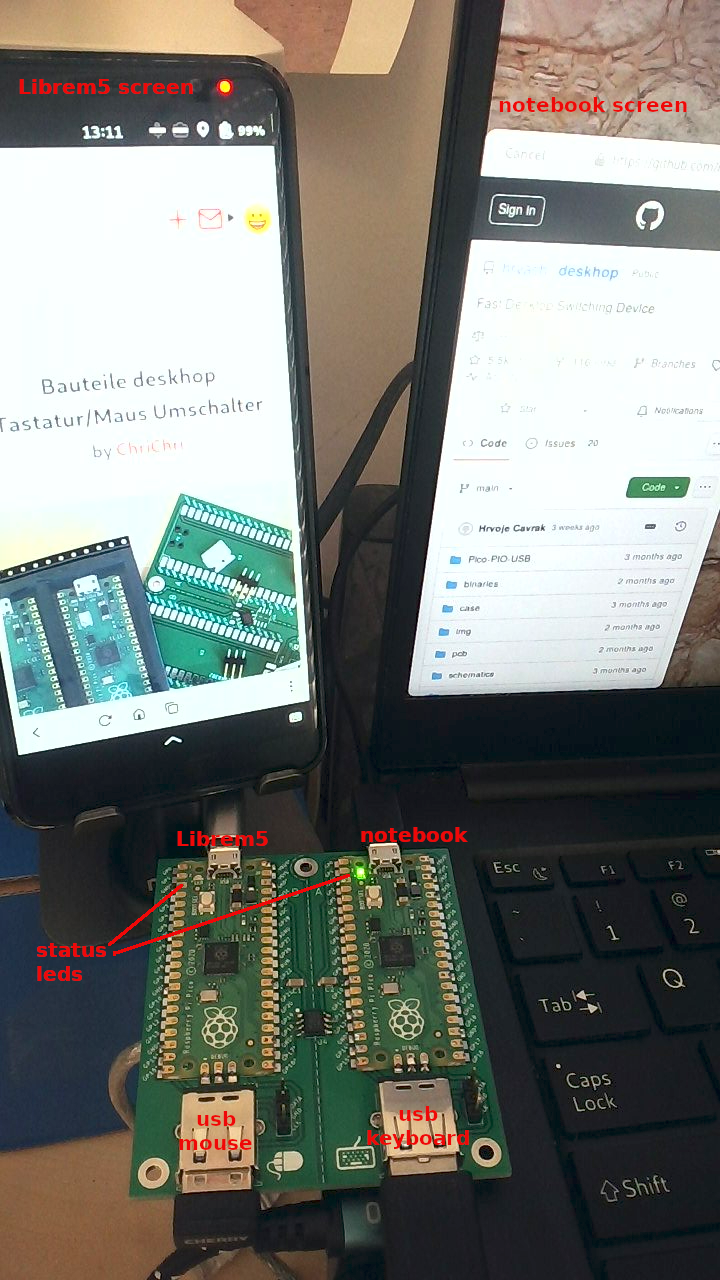#deskhop now uses a different serial number for each board. This allows to use the same notebook on two different desks each installed with its own deskhop and different keyboards.
#udev now can distinguish between the two keyboard/mouse combinations connected to deskhop. This allow for different setting/keymappings on the two different keyboards.
I added my solution to the original issue.
Due to the discussion around #deepseek and the #privacy aspects of using it I read about #KeystrokeDynamics.
Imagine - each time you fill a form on the some website you're actually leaving fingerprints on it by the way you type. If the site reads your keyboard through a websocket connection and thereby knows the rhythm you have clicking your single keys, the time you hold down each key and the pauses you make thinking, this is a biometric that might even reveal the mood you're in.
There's tons of literature out there about various aspects of using keystroke dynamics.
I'm using a #deskhop* to connect my keyboard and mouse to my notebook and #Librem5 mobile phone to use both seamless like a multi-monitor setup.
Reading about a failed indiegogo campaign to build a usb device changing the metrics of typing in a way to cloak keystroke dynamics I had the idea that this maybe could be an extension to deskhops functionality.
Ha! First time I pushed the Assign button on my flohmarkt for the first article finally sold (out). All people interested in the #deskhop pcb and parts received a message that I sold them all.
I hope that the #flohmarkt #fediverse will grow until there are enough people to exchange goods and services locally and generally quickly find the things I'm looking for or find someone interested in the stuff I do not want anymore, but that might be of value for someone else.
Maybe the upcoming #yunohost integration will enable some more people to run an instance of their own.
Yes!
On an unencrypted registration SSID authorized a client through a portal page.
Then showed the client via dpsk (dynamic pre-shared key) provisioner login data for the encrypted SSID to connect to a network with internet access.
When the client connects to the unencrypted SSID it gets redirected to a portal to enter an email address (and possibly other data). Packetfence sends an email to a pre-configured address (owned by the sponsor) containing a link to approve the request for access.
The client waits on a portal html page for the sponsor to click the link. After the sponsor clicks the link to approve the request the clients web page reloads and shows the name of the encrypted SSID to connect to and a password for the connection.
Next step to accomplish: configure OpenWRT (hostapd) and Packetfence to allow the usage of the PSK to connect to the encrypted SSID.
BTW: Testing this I'm using #deskhop to switch seamlessly between my notebook and my #Librem5 which I use as a test client for the wifi connection to the OpenWRT access point.
When doing the #deskhop to share keyboard/mouse between my #Librem5 and my notebook on the Librem5 still the on-screen keyboard (#osk) keeps popping up and takes away part of the small screen.
This can be disabled through gsettings but doing so each time when I place the phone beside my notebook is tiresome.
So I recovered some old proof of concept I had made, tested it and packaged it:
switch-keyboard installs an #udev rule that triggers when an external keyboard is connected and disables the osk. On disconnect it re-enables the osk and there is an entry for the menu included to just toggle the keyboard on and off just in case you're left without #osk after disconnecting an external keyboard.
@white_gecko@chaos.social guessed it already: It's a really cute hardware hack called the #deskhop.
Everything you need to know to build a #deskhop can be found in its repository.
The parts you'll need are easily found and the pcb can be manufactured using the provided files.
Or you could look for a complete set of parts on flohmarkt.
@white_gecko@chaos.social @zeroday@podcasts.social
Hardware which contains some #FLOSS. But no software installed on the two devices sharing mouse/keyboard.
It's like a KVM.
still #deskhop•ping
I'll give away so much: #Librem5 and notebook…
- do not use extra software
- do not have a data connection
- it is a hardware solution
- you could place any device in place of my Linux devices - windows, mac, android
Let's #deskhop some more!
BTW: when the mouse/keyboard focus moves to the Librem5 which is connected to an usb-hub the screen activates nicely - no need to press a button.
#Librem5 and notebook sharing the same keyboard and mouse.
Moving the mouse over the edge of the screen into the direction of the other device brings the mouse focus to the other device - just like moving the mouse between displays in a dual screen setup.
The keyboard focus follows. It is like a kvm that is controlled by the mouse position.
Let's #deskhop!





